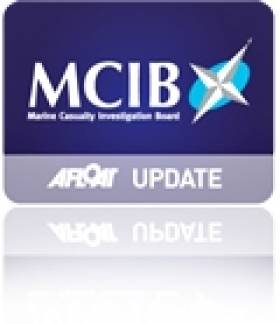Displaying items by tag: FV Liberty
MCIB Issues Report On Fisherman's Death By Head Injury On 'FV Liberty'
#MCIB - Poor adherence to various safety regulations made worse the situation in which a fisherman died of severe head injury off Cork in February last year, according to an official report into the incident.
As previously reported on Afloat.ie, the man was one of three crew on the fishing trawler FV Liberty that was hauling cod off the Old Head of Kinsale when the tragedy occurred on the evening of Thursday 14 February 2013.
The Marine Casualty Investigation Board's (MCIB) report into the incident details the sequence of events that led to the fatality, which was caused by the failure of split links in the vessel's hauling gear as a cod trawl net was being hoisted, striking the casualty on the head.
It was determined by the MCIB that the ropes and links used on the vessel were prone to jamming and the boat's head blocks were in poor condition - and that the incident may have been avoided if these were properly examined and maintained.
It was also found that none of the three crew had undergone basic safety training, and that none was wearing protective headgear on deck.
While the skipper was an experienced fisherman, he was new to this particular vessel. The casualty, too, had only joined the vessel that day, while the third crew member tasked with operating the lifting gear "would not be considered sufficiently experienced to conduct such a task".
Moreover, the vessel's radio equipment was found to be in poor condition, making communication with emergency services challenging.
Above all, the MCIB states that the vessel "did not comply with the requirements of the Fishing Vessel Code of Practice.
"The deficiencies in place on-board FV Liberty during the MCIB investigation showed that risk assessment was not completed, annual inspection was not carried out for lifting equipment, and personnel had not completed the required training."
The full MCIB report into the FV Liberty incident is available to download below.
























































